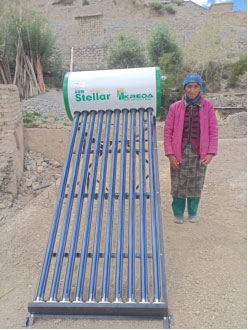 Solar thermal energy is a renewable energy source that harnesses the heat from the sun to generate electricity or heat water. It is a clean and sustainable alternative to fossil fuels that can help reduce greenhouse gas emissions and combat climate change. The systems of solar thermal energy used by KREDA in Kargil works by using mirrors or lenses or vacuum glass tubes. In mirror-based systems, such as solar concentrators, the mirrors are used to concentrate sunlight onto a receiver, which then converts the sunlight into heat. This heat is used to generate steam to cook food/dal/rice and namkeen chaii etc. and in case of Solar Water Heater, tubes are used as collector to collect sunlight to heat water for residential or commercial use. The technology used to capture and convert solar energy into usable heat has been rapidly advancing in recent years, making it a viable and cost-effective option for many applications.
Solar thermal energy is a renewable energy source that harnesses the heat from the sun to generate electricity or heat water. It is a clean and sustainable alternative to fossil fuels that can help reduce greenhouse gas emissions and combat climate change. The systems of solar thermal energy used by KREDA in Kargil works by using mirrors or lenses or vacuum glass tubes. In mirror-based systems, such as solar concentrators, the mirrors are used to concentrate sunlight onto a receiver, which then converts the sunlight into heat. This heat is used to generate steam to cook food/dal/rice and namkeen chaii etc. and in case of Solar Water Heater, tubes are used as collector to collect sunlight to heat water for residential or commercial use. The technology used to capture and convert solar energy into usable heat has been rapidly advancing in recent years, making it a viable and cost-effective option for many applications.
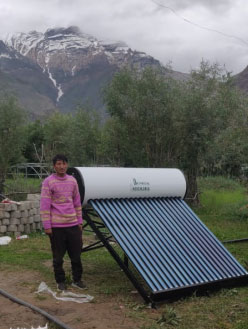 One of the main advantages of solar thermal energy is its versatility. It can be used to generate electricity on a large scale in solar power plants, or on a smaller scale for residential or commercial buildings for heating water or cooking food. In addition to providing clean energy, solar thermal systems can also help reduce energy costs and reliance on traditional energy sources.
One of the main advantages of solar thermal energy is its versatility. It can be used to generate electricity on a large scale in solar power plants, or on a smaller scale for residential or commercial buildings for heating water or cooking food. In addition to providing clean energy, solar thermal systems can also help reduce energy costs and reliance on traditional energy sources.
Furthermore, solar thermal energy systems have a relatively low environmental impact compared to fossil fuels. They do not produce greenhouse gas emissions or other harmful pollutants, making them an environmentally friendly option for energy production. In addition, solar thermal systems require little maintenance and have a long lifespan, making them a reliable and cost-effective investment for the future. KREDA has installed thousands of Solar Water heaters in the region of Ladakh during the past few years. Nearly about 1785 households have been covered under Solar Water Heater, issued under the Subsidy Component of the LAHDC Kargil. In total, 200LPD and 100 LPD, 577 and 1208 nos. respectively were issued through the concern councilors of the constituencies during FY 2021-22.
Despite these advantages, there are some challenges and limitations to the widespread adoption of solar thermal energy. The cost of installing and maintaining solar thermal systems can be high, although the decreasing cost of technology and government incentives have made it more affordable in recent years. KREDA has been installing Solar Water Heaters under the Scheme of Subsidy Component of the LAHDC Kargil, UT Ladakh. Under the scheme the agency has been providing the system on 75% subsidy. Additionally, solar thermal energy is dependent on sunlight, so its availability is limited by factors such as location and weather conditions.
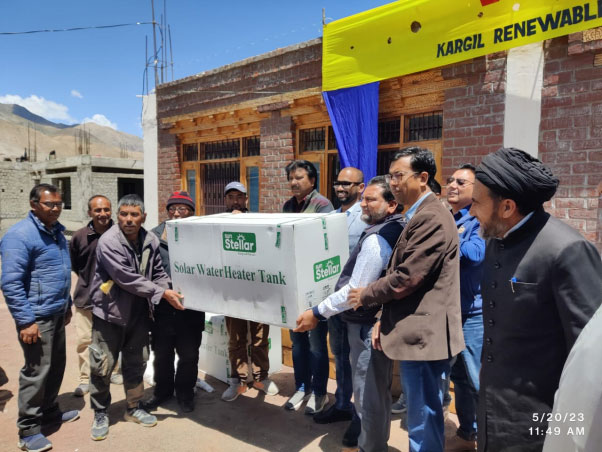 KREDA has also issued solar green houses for production of vegetable during the winter season. KREDA was the first agency to introduce polycarbonated solar green house in Kargil which is now carried out by the Agriculture Department. In April 2010 the MNRE sanctioned the Ladakh Renewable Energy Initiative Scheme with the objective of mminimizing use of diesel / kerosene in Ladakh as much as possible and meet energy requirements of the region through renewable energy and use conservation techniques for housing and agriculture and improve livelihood.
KREDA has also issued solar green houses for production of vegetable during the winter season. KREDA was the first agency to introduce polycarbonated solar green house in Kargil which is now carried out by the Agriculture Department. In April 2010 the MNRE sanctioned the Ladakh Renewable Energy Initiative Scheme with the objective of mminimizing use of diesel / kerosene in Ladakh as much as possible and meet energy requirements of the region through renewable energy and use conservation techniques for housing and agriculture and improve livelihood.
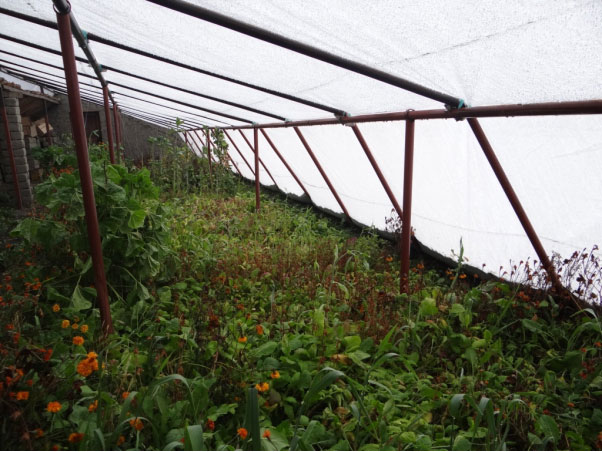 Construction of Solar Green Houses (Commercial and Domestic type) was one of the various approaches taken by the ministry to meet its target. The ministry sanctioned 3000 nos. of Domestic Green Houses and 375 nos. of commercial green houses for KREDA with 60% support from MNRE in each scheme (the MNRE support at initial stage was only 50%). This is true that there is a great shortage of fresh vegetable and other daily items during winter season, as Kargil remains totally cut-off from rest of the subcontinent for winter six months. Since the benefit and impact of this scheme (Green House) is remarkable the demand from public for the system is rising day by day.
Construction of Solar Green Houses (Commercial and Domestic type) was one of the various approaches taken by the ministry to meet its target. The ministry sanctioned 3000 nos. of Domestic Green Houses and 375 nos. of commercial green houses for KREDA with 60% support from MNRE in each scheme (the MNRE support at initial stage was only 50%). This is true that there is a great shortage of fresh vegetable and other daily items during winter season, as Kargil remains totally cut-off from rest of the subcontinent for winter six months. Since the benefit and impact of this scheme (Green House) is remarkable the demand from public for the system is rising day by day.
The Green houses constructed by Kargil Renewable Energy Development Agency (KREDA) have uplifted the poor community out of poverty to large extent. It is noticed that hundreds of families from Scheduled Tribe (ST) background and from Below Poverty Line (BPL) have been benefited and have become self-sufficient, in terms of food security during winter, from the Scheme. The Green Houses have raised the family income of the beneficiaries by 20 to 30 % by selling the vegetables. The income is generated during peak winter months when there is no other opportunity to earn a livelihood.
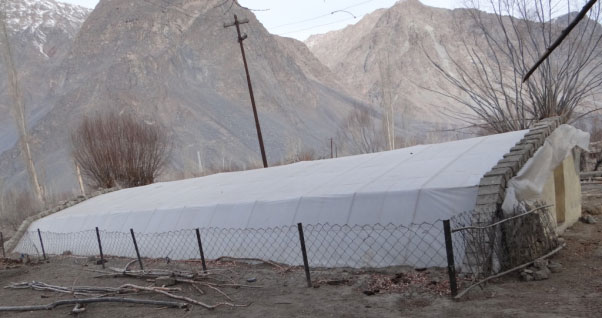
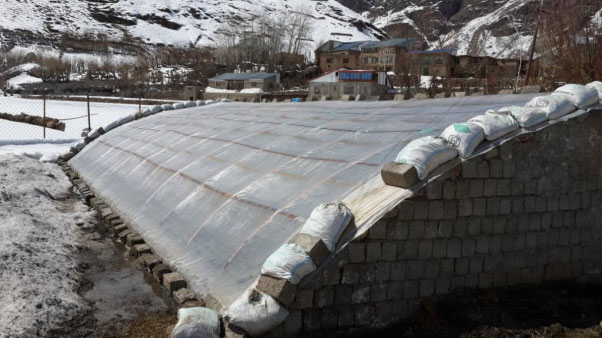 The DGH/CGH beneficiaries use to spend the earned money (profit) on their children's education. Thus the number of dropouts in schools is gradually coming down. Which is a metter of proud for whole the district.
The DGH/CGH beneficiaries use to spend the earned money (profit) on their children's education. Thus the number of dropouts in schools is gradually coming down. Which is a metter of proud for whole the district.
The most active members of the DGH/CGH owners are the women folk. They use to sell the grown vegetables in market where there is social or public interaction which gives them confidence and also boost their skill in business.
The impact of Green House on health is remarkable again. The green house supplies fresh and green vegetable to public during the peak winter months when each especially patients are desperate to even see a single green leaf. Availability of green and fresh leafy vegetable improves the health condition of the people. Consumers of the greenhouse vegetable are now gradually becoming aware and concerned that the food that they are purchasing and eating is healthy, free of hormones and pesticides, and has not travelled long distances to reach the table.
While doing our survey work, we met many people, in and around the main Kargil town, who have committed their hearts and energy to growing vegetables during the winter. They have tremendously maintained their green houses and have not only learnt growing vegetables in winter but have also dedicated their time to sharing what they have learned to others creating a network where people can share what they have been learning.
Thus, as a whole the Green House Scheme of the Ministry of New and Renewable Energy, GoI, has led to a consolidation and stabilization of the poor section of the community in Kargil, especially it has opened the door for more local employment and hope for ecological and economical uplift within the women folk.
Overall, solar thermal energy is a promising renewable energy source that has the potential to play a significant role in the transition to a more sustainable energy future. With ongoing advancements in technology and growing global support for renewable energy, solar thermal energy has the potential to become a key component of our energy infrastructure and help to reduce our reliance on fossil fuels.
| Under LREI | ||||
| Solar WHS | Installed Cumulative Capacity in Ltr | 666000 | 6660 | |
| Diesel Savings in L (Annually) | 1239759 | Litre | ||
| CO2 Savings (In Kg) | 3099398 | Kg | ||
| CO2 Savings (In Ton) | 3099.398 | tCO² | ||
| Under Subsidy & Others | ||||
| Solar WHS | Installed Cumulative Capacity in Ltr | 597700 | 5977 | |
| Diesel Savings in L (Annually) | 1112619 | Litre | ||
| CO2 Savings (In Kg) | 2781546 | Kg | ||
| CO2 Savings (In Ton) | 2781.546 | tCO² |